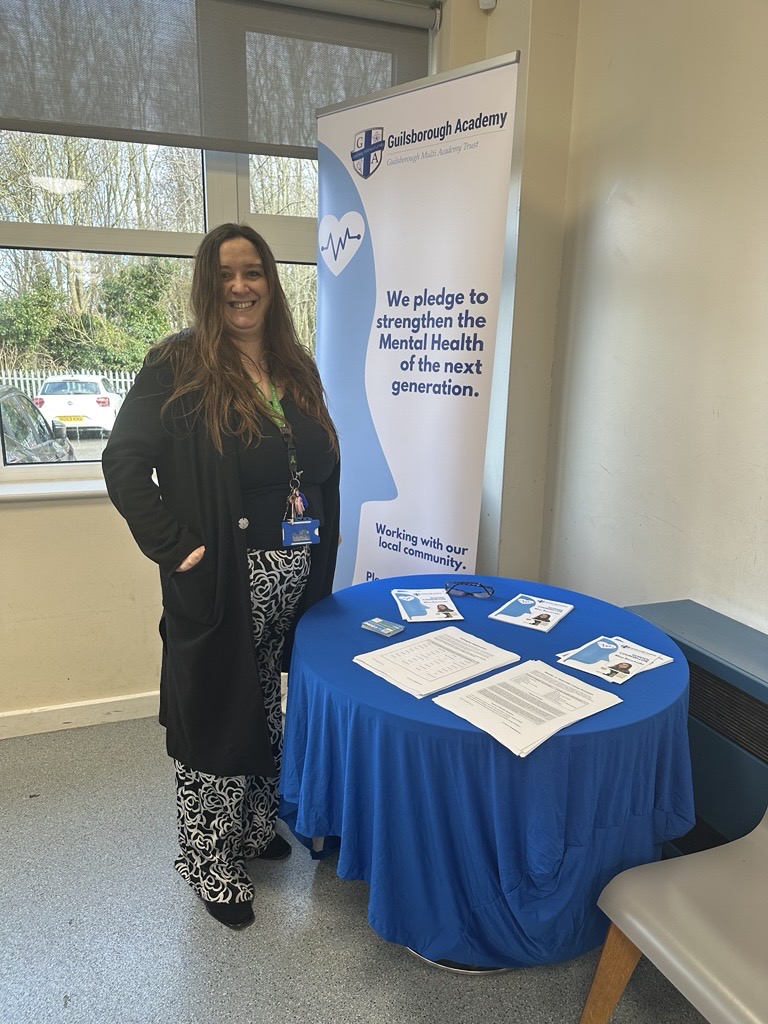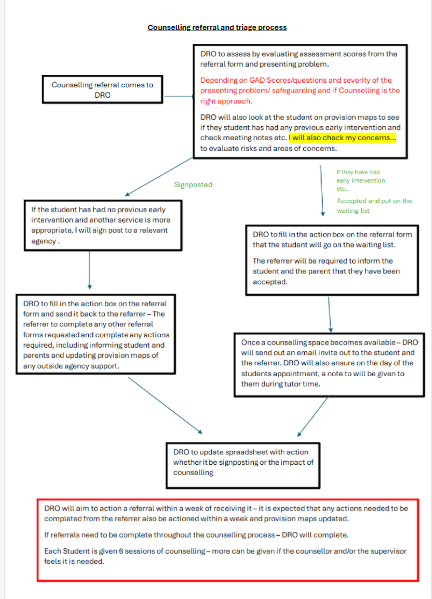School Counsellor
OUR SCHOOL COUNSELLOR
The school counsellor plays a pivotal role in supporting the emotional wellbeing and safeguarding of students. As a qualified counsellor, she provides direct therapeutic support to pupils, while also training staff to deliver high-quality Social, Emotional and Mental Health (SEMH) interventions and overseeing their implementation across the school. In her capacity as a Duty designated Safeguarding Lead, she ensures robust safeguarding procedures are in place and followed, working closely with staff and external agencies to protect vulnerable students. She leads assemblies to promote mental health awareness, supplies tailored resources to teaching staff for tutor time activities, and maintains strong partnerships with external services such as CAMHS, the school nurse, and the Mental Health Support Team. Additionally, she manages referrals to appropriate services, ensuring timely and effective support for students in need. Her role is integral to fostering a safe, inclusive, and mentally healthy school environment.
How to Get in Touch:
Phone: 01604 740641 Ext: 220
Email: drowinski@guilsborough.northants.sch.uk

Miss Rowinski thoroughly enjoyed interacting with so many students and said:
All the children were so engaged with the leaflets, handouts and comfort cards. A lot of students approached me, and it was an open platform for the students to talk about their experiences of Mental Health and Wellbeing.
In school counselling
Our in-school counselling service offers students a safe, confidential environment to explore their thoughts, feelings, and emotional challenges with a qualified professional. Counsellors support students in developing coping strategies, enhancing self-esteem, and addressing issues such as stress, anxiety, bullying, and family-related concerns. The service also helps identify learning barriers, provides crisis support, and promotes improved mental health and academic engagement.
Low Mood intervention
This intervention adopts a holistic approach to improving emotional wellbeing. Strategies include maintaining social connections, increasing physical activity, establishing daily routines, and engaging in self-care practices such as listening to uplifting music and pursuing hobbies. For persistent or severe low mood, professional support—such as talking therapies or medication—may be recommended.
Bespoke, person centred interventions.
We offer tailored interventions to meet the unique social, emotional, and mental health (SEMH) needs of each child. Topics may include body image, healthy relationships, puberty, and more. Where appropriate, we collaborate with a range of external agencies to provide comprehensive support. These include:
- JOGO Behaviour Support
- Service Six
- Voice
- Office of the Police, Fire and Crime Commissioner (OPFCC)
- Mental Health Support Team
- School Nursing Service
- CAMHS (Child and Adolescent Mental Health Services)
- And many others
Self-esteem intervention
Our self-esteem programmes incorporate self-help techniques such as challenging negative thoughts, practicing self-compassion, journaling, setting achievable goals, and building supportive relationships. These strategies aim to foster a positive self-image, enhance self-awareness, and encourage healthier beliefs and behaviours.
Anxiety intervention
We create nurturing environments with clear routines and calming spaces to support students experiencing anxiety. Interventions include teaching coping mechanisms like deep breathing and mindfulness, offering tailored support plans, and ensuring staff are available to listen. A tiered support system is used to address varying levels of need, with an emphasis on normalising anxiety and providing consistent daily structure.
Anger Management
Our anger management strategies help students identify triggers, apply calming techniques such as deep breathing and mindfulness, and express emotions constructively through journaling or “I” statements. Role-play scenarios are used to build empathy and problem-solving skills. Schools may also implement designated “cool-down” areas and train staff to model effective de-escalation and coping strategies.
Zones
This framework teaches students to identify their emotional and alertness states using a four-colour system: Blue, Green, Yellow, and Red. Each student receives a personalised toolkit of strategies to manage these states. The goal is to build self-awareness and self-regulation, empowering students to transition to the optimal “Green Zone” and independently manage their emotions and impulses.

The Strength Exploration worksheet was perfect for this year's theme 'know yourself, grow yourself', as the worksheet is about reflecting on who you are and how others see you.
The Healthy vs. Unhealthy Coping Strategies worksheet is invaluable as it helps young people recognise healthy ways to cope with their emotions.
Comfort Card information is available on the link below.
Miss Rowinski provides confidential support to students who may be struggling with their emotional wellbeing. She also works in partnership with The Lowdown, the NHS Mental Health Support Team, and JOGO to ensure students receive the right support.
Parents and carers who have concerns about their child’s mental health can contact Miss Rowinski to arrange a Teams meeting or phone call for guidance.
West Northamptonshire County Council (WNC) new initiative: Family Hubs
The last weekend of March saw the opening of WNC's first Hub in Towcester. Very soon, there will be announcements about the two other main Hubs in Daventry and Northampton, with further information about 6 spoke (or satellite) Hubs.
Please follow their social media accounts.
Family Hubs social media: Facebook and Instagram


